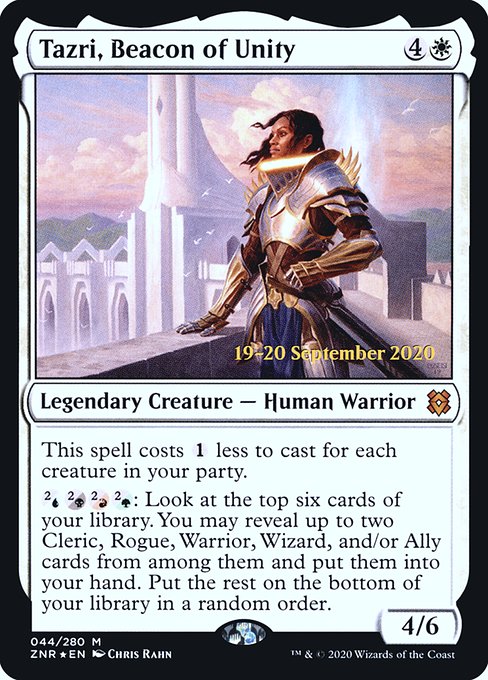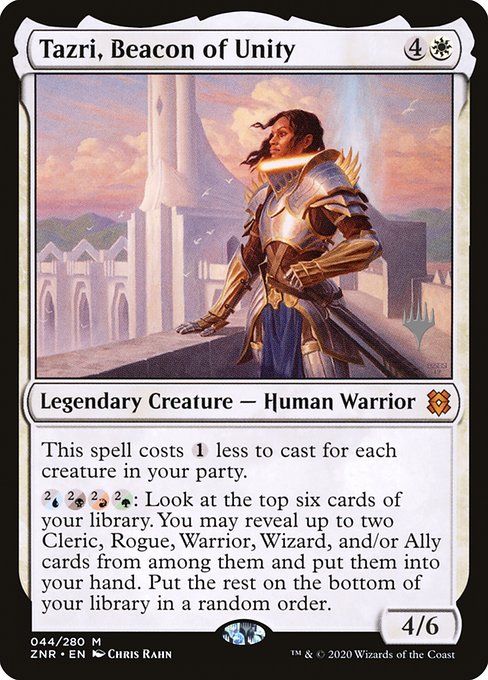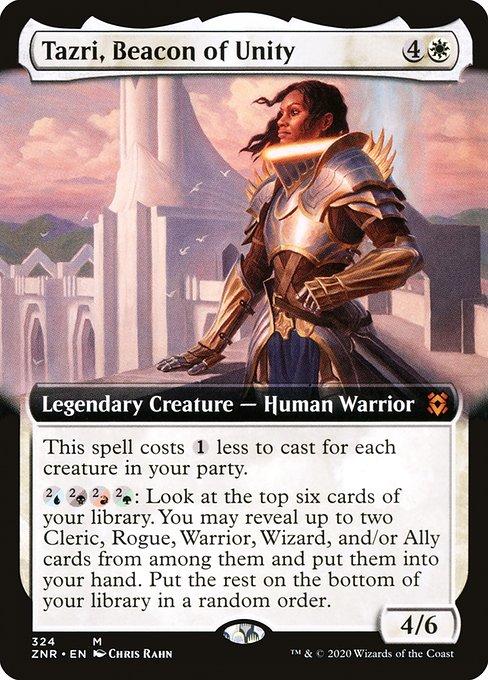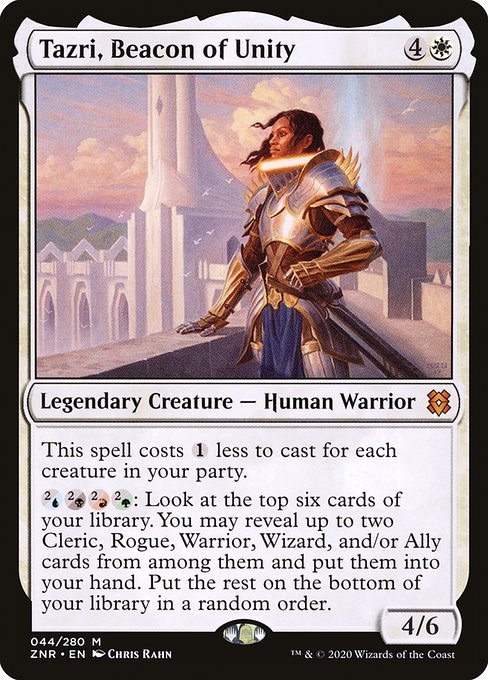standard
future
historic
gladiator
pioneer
explorer
modern
legacy
pauper
vintage
penny
commander
brawl
alchemy
paupercommander
duel
oldschool
premodern
Rulings
To determine “the number of creatures in your party,” check whether you control a Cleric, whether you control a Rogue, whether you control a Warrior, and whether you control a Wizard. The number is the total number of those checks to which you answered yes. Each creature you control can be counted for only one of those checks.
Ally is a creature type that doesn’t appear in the Zendikar Rising set, but it has appeared in previous sets featuring the plane of Zendikar.
To determine the cost of Tazri’s activated ability, you choose which cost you’ll pay for each of the four mana symbols (either or one mana of the appropriate color), add up the total cost, apply any additional costs, then apply any cost reductions.
An ability referring to the number of creatures in your party gets a number from zero to four. Such abilities never ask which creatures are in your party, and you never have to designate specific creatures as being in your party. You can’t choose to exclude creatures from this count to lower the number.
Several cards have a cost reduction based on the number of creatures in your party. To determine the total cost of a spell, start with the mana cost or alternative cost you’re paying, add any cost increases, then apply any cost reductions. The converted mana cost of the spell is determined only by its mana cost, no matter what the total cost to cast the spell was.
Tazri’s activated ability lets you put up to two cards total into your hand, not two cards of each of the listed creature types.
If a spell has a cost reduction based on the number of creatures in your party, no player may attempt to change that number after you begin to cast the spell but before you pay the cost.
If a creature has more than one party creature type, and there are multiple ways to count that creature that could result in a different number of creatures in your party, the highest such number is used. For example, if you control a Cleric and a Cleric Wizard, the number of creatures in your party is two. You can’t choose to have it be just one by counting the Cleric Wizard first as a Cleric.
Ally is a creature type that doesn’t appear in the Zendikar Rising set, but it has appeared in previous sets featuring the plane of Zendikar.
To determine the cost of Tazri’s activated ability, you choose which cost you’ll pay for each of the four mana symbols (either or one mana of the appropriate color), add up the total cost, apply any additional costs, then apply any cost reductions.
An ability referring to the number of creatures in your party gets a number from zero to four. Such abilities never ask which creatures are in your party, and you never have to designate specific creatures as being in your party. You can’t choose to exclude creatures from this count to lower the number.
Several cards have a cost reduction based on the number of creatures in your party. To determine the total cost of a spell, start with the mana cost or alternative cost you’re paying, add any cost increases, then apply any cost reductions. The converted mana cost of the spell is determined only by its mana cost, no matter what the total cost to cast the spell was.
Tazri’s activated ability lets you put up to two cards total into your hand, not two cards of each of the listed creature types.
If a spell has a cost reduction based on the number of creatures in your party, no player may attempt to change that number after you begin to cast the spell but before you pay the cost.
If a creature has more than one party creature type, and there are multiple ways to count that creature that could result in a different number of creatures in your party, the highest such number is used. For example, if you control a Cleric and a Cleric Wizard, the number of creatures in your party is two. You can’t choose to have it be just one by counting the Cleric Wizard first as a Cleric.
Rulings
To determine “the number of creatures in your party,” check whether you control a Cleric, whether you control a Rogue, whether you control a Warrior, and whether you control a Wizard. The number is the total number of those checks to which you answered yes. Each creature you control can be counted for only one of those checks.
Ally is a creature type that doesn’t appear in the Zendikar Rising set, but it has appeared in previous sets featuring the plane of Zendikar.
To determine the cost of Tazri’s activated ability, you choose which cost you’ll pay for each of the four mana symbols (either or one mana of the appropriate color), add up the total cost, apply any additional costs, then apply any cost reductions.
An ability referring to the number of creatures in your party gets a number from zero to four. Such abilities never ask which creatures are in your party, and you never have to designate specific creatures as being in your party. You can’t choose to exclude creatures from this count to lower the number.
Several cards have a cost reduction based on the number of creatures in your party. To determine the total cost of a spell, start with the mana cost or alternative cost you’re paying, add any cost increases, then apply any cost reductions. The converted mana cost of the spell is determined only by its mana cost, no matter what the total cost to cast the spell was.
Tazri’s activated ability lets you put up to two cards total into your hand, not two cards of each of the listed creature types.
If a spell has a cost reduction based on the number of creatures in your party, no player may attempt to change that number after you begin to cast the spell but before you pay the cost.
If a creature has more than one party creature type, and there are multiple ways to count that creature that could result in a different number of creatures in your party, the highest such number is used. For example, if you control a Cleric and a Cleric Wizard, the number of creatures in your party is two. You can’t choose to have it be just one by counting the Cleric Wizard first as a Cleric.
Ally is a creature type that doesn’t appear in the Zendikar Rising set, but it has appeared in previous sets featuring the plane of Zendikar.
To determine the cost of Tazri’s activated ability, you choose which cost you’ll pay for each of the four mana symbols (either or one mana of the appropriate color), add up the total cost, apply any additional costs, then apply any cost reductions.
An ability referring to the number of creatures in your party gets a number from zero to four. Such abilities never ask which creatures are in your party, and you never have to designate specific creatures as being in your party. You can’t choose to exclude creatures from this count to lower the number.
Several cards have a cost reduction based on the number of creatures in your party. To determine the total cost of a spell, start with the mana cost or alternative cost you’re paying, add any cost increases, then apply any cost reductions. The converted mana cost of the spell is determined only by its mana cost, no matter what the total cost to cast the spell was.
Tazri’s activated ability lets you put up to two cards total into your hand, not two cards of each of the listed creature types.
If a spell has a cost reduction based on the number of creatures in your party, no player may attempt to change that number after you begin to cast the spell but before you pay the cost.
If a creature has more than one party creature type, and there are multiple ways to count that creature that could result in a different number of creatures in your party, the highest such number is used. For example, if you control a Cleric and a Cleric Wizard, the number of creatures in your party is two. You can’t choose to have it be just one by counting the Cleric Wizard first as a Cleric.
Your collection? Your decks?
Want to manage your collection and/or create decks?



 0
0
 0.22€
0.22€

